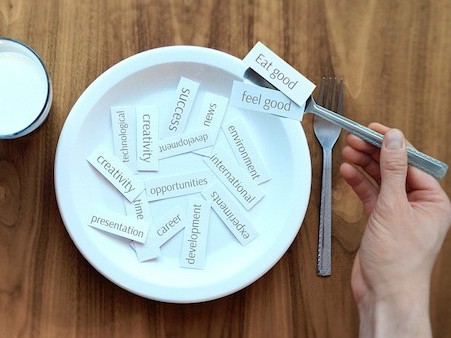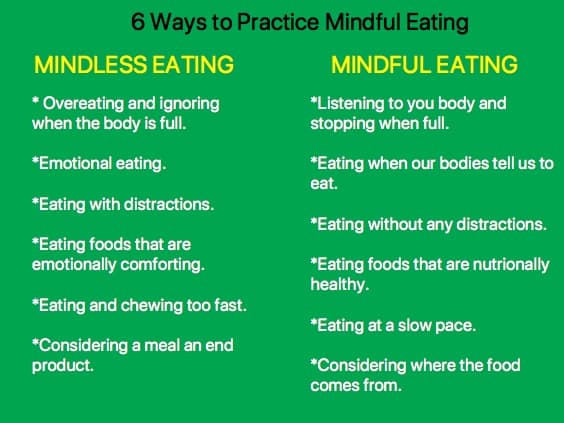Each one of us is fond of eating, but we are unaware of ‘Mindful Eating’.
We never realize what the food we eat every day does to our bodies. We eat mindlessly and harm our bodies in the long run.
I would like to give you an example of my own experience. Being an absolute ardent fan of eating and trying out different cuisines, I succumbed to food like there was no end to it. However, without realizing it, I was stuffing myself to a large extent. I began to put on weight, felt super unhealthy and ended being diagnosed with hypothyroidism.
Psychologists find that Cooking is Meditation

This wasn’t a healthy way of eating. Thus, I developed bad eating habits over the years. Eating while socializing, to relieve stress, out of boredom, to satisfy my endless cravings were my reasons to eat. But, the one that I most struggled with was the fear of missing out also known today as FOMO. The feeling or fear of missing out on good food.
However, when I started to feel tired, fatigued, overstressed and suffered sleepless nights, I knew something was not right. Therefore, I started to change my eating habits and realized how bad things were. This transformation or change was extremely difficult because I ate mostly without thinking.
Coping with my child leaving for University
How to Create Mindfulness?
http://wordpress-334546-1028402.cloudwaysapps.com/how-to-create-mindfulness-mindful-wellnessworks/?preview_id=2275&preview_nonce=2345e58ac0&post_format=standard&_thumbnail_id=2478&preview=true
But, the moment I paid attention to what I ate and how it made me feel during and after eating, made me realize how different my body felt.
I also learned to control my urges, cravings and the emotions that triggered binge eating.

Dr. Lilian Cheung, a nutritionist, and lecturer at Harvard T.H. Chan School of Public Health state – “Because we’re working, driving, reading, watching television, or fiddling with an electronic device, we’re not fully aware of what we’re eating. And this mindless eating, a lack of awareness of the food we’re consuming, may be contributing to the national obesity epidemic and other health issues.”
After doing some intense research and studies, I came across the term MINDFUL EATING. Till now, I never knew what it really meant and how beneficial it can be for your body.
Thus, this article will explain what mindful eating is all about. It will elaborate on how it benefits you and your body and what you need to do to get started.
How to Heal Your Back Ache and Knee Pain
Trust me, this will change your opinion on how and what you eat.
What is mindful eating?
Let’s start with the word, Mindfulness and what does it mean. Mindfulness is a form of meditation that helps you to focus on the present moment. It also helps you to acknowledge and accept your feelings, thoughts, and physical sensations. It is a concept that comes from Buddhist teachings.
Mindfulness helps in treating conditions such as eating disorders, depression, anxiety, and various food-related behaviors.
The principle of mindfulness applies to mindful eating as well, but the concept of mindful eating goes beyond the individual.
Mindful eating brings about awareness on the menu, and whenever you eat. It also aims to transform your relationship with food by encouraging a more holistic point of view. Ultimately, you have a better understanding of which kind of food is healthy for you and nourishes you right through.
Also, mindful eating encourages a sense of appreciation for every meal, every mouthful, and every ingredient that you eat and taste.

In true essence, mindful eating means being fully attentive to your food as you buy, prepare, serve, and consume it.
In short, mindful eating involves:
- Eating slowly and without any distraction. Try to eat without multi-tasking.
- Eating when your body feels hungry and stop until your body is full. Do not over-eat.
- Distinguishing between actual hunger and non-hunger triggers for eating.
- Engaging your senses by noticing smells, textures, and tastes.
- Learning to cope with guilt and anxiety about food.
- Eating to maintain overall health and well-being.
- Noticing the effects of food on your feelings and body.
- Appreciating your food with gratitude.
However, adopting mindful eating techniques and practice may take more than a few adjustments in the way you approach meals and snacks.

Engage the senses
When was the last time you truly paid attention to what you were eating?
Often, you chow down a meal while watching TV or looking down on your screens or reading a book. As a result, you gulp down with speed not realizing you have eaten more than needed.
Hence, mindfulness invites you to remove distractions and sit uninterrupted with your food and fellow diners. In doing so, you begin to take time over a meal. In eating and chewing more slowly, you savor the flavors, the aromas, and the textures.
The benefits of incorporating mindfulness are potentially life-changing. Why so? Because it allows you to let go of the restrictions around food. Moreover, it helps you to focus on awareness, self-compassion, and freedom of choice.
Is Mindful Eating a diet?
To be clear, mindful eating is no diet. There are no restrictions, no radical cleanse, eliminating certain foods, no fad diets, and no quick fixes.
Mindful eating is a framework to guide you to make more mindful food choices that might lead to weight loss.
Why Should You Try Mindful Eating?
In a fast-paced society, you have an abundance of food choices to choose from. Plus, life seems to be hectic and not a minute to eat without doing another task or activity.
You tend to eat while watching TV or checking your emails in the office. By the time you realize, you have gulped down your food without chewing and that sometimes leaves you hungry again. As a result, this leads to overeating and further to weight gain.

Did you know?
The brain takes up to 20minutes to realize that you are full. But, mindless acts of eating disrupt that signal as it may not arrive your brain in time. Therefore, this leads to a problem of binge eating.
By eating mindfully, you restore your attention and slow down. As a result, eating becomes an intentional act instead of an automatic one.
Also, you are able to distinguish between emotional and actual hunger.

Yoga for Kids – A Requirement or Necessity?
Mindful Eating and Weight loss
Mindful eating and mindful cooking allow you to savor food without any guilt, judgment, and anxiety. Let that over-worked mind of yours not interfere with your thoughts regarding food.
This approach will help you to spend less time on your weight and everything that is related to weight loss and weight gain. Therefore, when your mind embraces mindful eating and mindful cooking, you appreciate the right weight for you automatically.
Have you noticed that most of the time when you follow any diet, you are under constant pressure and fear? You are constantly thinking about the food that you are restricted to eat.

Conventional diets, as a result, cause stress, anxiety, and false expectations. Thus, you tend to view food as a reward or punishment. You desperately wait for a cheat day and end up eating everything without thinking.
Chronic stress, binge eating, emotional eating lead to weight gain after successful weight loss. Stress and emotional imbalance are triggers for mindlessly overeating.
On the contrary, the notion of being ‘thin’ has taken over the minds of many of you. As a result, you suppress your feelings of hunger and invite a number of health ailments to your body.
Also, for those who overeat do not know when to stop and ignore the feelings of fullness.
Moreover, eating awareness encourages to shed the common mindset about losing weight easily. It has no such strategy of calorie counting.
6 Anytime anywhere weight loss tips for you
Research on Eating Mindfully
Eat Slowly! You eat too fast.
Doesn’t this ring a bell when you ate as a child and your grandparents asked you to slow down. “Distracted, hurried eating may add pounds and take away pleasure.”
Mindful eating is all about becoming conscious of the smells, flavors, colors, textures, and temperatures of the food you eat. It is about chewing every bite slowly, shedding distractions like a mobile phone or playing games on TV or reading. You learn to cope with emotions brimming with guilt and fear regarding food.
Mind and Gut Connection
Food digestion is all about the connection between your nervous system and gut.
In his book What are you Hungry for? – Deepak Chopra explains the reasons for being hungry. He beautifully explains how to differentiate them from emotional signals often misunderstood by your brain as hunger pangs.
As per a study of 150 binge eaters, those who practiced meditation during meals and the rest of the day – seemed to enjoy their food and struggled less with eating.
Psychologist Jean Kristeller at Indiana State University states that mindfulness makes people understand the difference between physical and emotional hunger. It helps you to have a “moment of choice” just before you have the urge to eat.

A Kit to Eat Mindfully:
Experts have various suggestions to help beginners build eating awareness. The key is to eat your meal slowly at least once a day or once a week as per your convenience.
How to follow this Suggestion:
1. Eat a normal meal however set your stopwatch for 20 minutes.
2. As you open the box of cookies think: What am I hungry for? Do I really want to eat? If you think you are not ‘really’ hungry do something that makes you feel happy: go for a walk, listen to music, watch a funny clip.
3. Try eating with the opposite hand to the one you normally use to eat. If you eat using your right hand – try eating on your left hand.
4. Eat in silence. Be in gratitude for the food on your table, for the farmer who produced it, for the lorry driver who transported it, to the grocer who sold it, to the hands who cooked it.
5. Chew slowly and very well – as per Ayurveda if you chew 40 times per bite – the food digests better because the saliva dissolves the food. Take smaller bite sizes always.
6. You could try using fork or chopsticks – the ones you don’t use on a daily basis or eat with your fingers if you always eat using a spoon.
Best Time to eat Breakfast Lunch and Dinner as per Ayurveda
The benefits of mindful eating
The benefits of mindful eating will definitely be subjective. It all depends on different body types for different reasons. Thus, something healthy for one could be unhealthy for the other.
“Healthy” isn’t defined by body weight or shape. Likewise, a thin person does not equate to being healthy or an overweight person cannot be considered unhealthy.
Therefore, we, as individuals need to spread this kind of awareness and perspective about our bodies. As a result, you will then discover renewed confidence, freedom, and self-acceptance.
Mindful eating serves a number of benefits to your well-being.
- Promotes positive eating behaviors.
- It leads to sustained and moderate weight loss especially for those desperately trying to lose weight.
- Prevents binge eating and helps you savor your food better.
- Better digestion and absorption of nutrients.
- It reduces stress, anxiety and other psychological related health issues.
- It prevents overeating and helps you to understand your food triggers.
- Reduces food cravings and calories.
- Increases your level of concentration, therefore helping you to focus on your everyday activities.
- It helps you to be more aware of the portions of the food you serve and eat.
7 Techniques to Practice Mindful Eating
Each one of us has our own attitudes and patterns of behavior around food. This is either due to genetics, circumstances, or family conditioning. Hence, Mindful eating awareness is the only way to understand our relationship with food and practice it in the right way possible.

There are many techniques you can follow to practice mindful eating. Here are a few to share:
- Shop smartly. Buy food items that are nutritionally healthy and on the basis of emotional needs.
- Remove processed foods from your kitchen and refrigerator. Avoid processed food as much as you can. For instance, ice-cream is a highly rated emotionally comforting food.
- Slow down while eating. This process will help you in the long run. You will notice that you end up eating lesser food than before.
- Savor your food. Enjoy your meal like it’s a wine tasting. Taste and notice all the flavors and textures in your food.
- Direct your attention to eating on a moment-by-moment basis. Use these cues as a guide on when to begin and end eating.
- Tune out from the world when you eat. Eat in silence and without any distractions.
- Tune in your every sense to experience the texture, the utensils, the presentation and the color of the food you eat. Notice every aspect of the food you eat and cook.
Conclusion
How often do you think about food? As soon as you get up, you have breakfast on your mind. Once you finish, you switch to thinking about what to eat for lunch. Maybe a steak burger or a bowl of noodles or some pizza. All you do all day is think about what you are going to eat next.
Food can’t be blamed for any of these thoughts. It is, however, simply the object of your fascination and cravings. The power lies in your emotions, your conditioning, and your decisions.
Inadvertently you train yourselves to listen to the voices in your head and to the voices of others as well. The population currently is obsessed with being thin and not fit. Thus, they either restrict themselves from eating or on the other hand overeat and ignore their body signals.
Therefore, Mindful eating helps you to be aware of your thoughts around food and how you can treat your body with love and gratitude. The biggest realization that mindful eating puts across is how we are influenced and feel around food.
Mindful eating also helps you to be grateful for the food you eat but with compassion and not swallow it down without savoring it. It boosts confidence, wisdom, and acceptance for the way your body is. No matter what shape or size you are.







